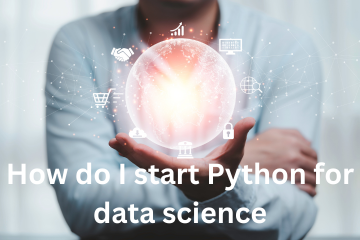Table of Contents
TogglePython has become one of the most popular programming languages for data science, thanks to its simplicity, flexibility, and the wide range of libraries and tools available. If you’re looking to start learning Python for data science, here’s a comprehensive guide to help you get started.
360DigiTMG offers the Best Data Science in Pune. in Kottayam to start a career in Data Science. Enroll now!
1. Install Python and Jupiter Notebook
The first step in learning Python for data science is to install Python and a code editor like Jupyter Notebook or Spyder. Python is available for download from the official website, and there are several versions of Python available, including Python 2.x and Python 3.x. It is recommended to install the latest version of Python, which is Python 3.x.
Jupiter Notebook is an open-source web application that allows you to create and share documents that contain live code, equations, visualizations, and narrative text. Jupiter Notebook supports more than 40 programming languages, including Python. You can install Jupiter Notebook using the pip package manager in Python.
2. Learn the Basics of Python
Before you can start using Python for data science, you need to learn the basics of the language. This includes understanding variables, data types, control structures, functions, and objects. You can learn Python through online tutorials, textbooks, or video courses. Here are a few resources to get started:
Python.org: The official website for the Python programming language has a tutorial that covers the basics of Python.
Cod academy: Cod academy offers a free interactive Python course that covers the basics of the language.
Data Camp: Data Camp is an online learning platform that offers interactive courses on Python for data science.
Coursera: Coursera offers several Python courses, including “Introduction to Python” and “Python for Data Science.”
3. Learn Data Science Libraries
Python has several data science libraries that make it easier to work with data. These libraries include NumPy, Pandas, Matplotlib, and Scikit-learn. Here’s an overview of these libraries:
NumPy: NumPy is a library that allows you to work with arrays and matrices in Python. It is used extensively in data science for tasks such as linear algebra and numerical computations.
Pandas: Pandas is a library that allows you to work with data in a tabular format. It provides data structures for efficiently storing and manipulating large datasets.
Matplotlib: Matplotlib is a library that allows you to create visualizations in Python. It provides a wide range of tools for creating charts, plots, and graphs.
Become a AI expert with a single program. Go through 360DigiTMG’s PG Diploma in Best Data Science in Hyderabad. Enroll today!
Scikit-learn: Scikit-learn is a library that provides tools for machine learning in Python. It includes algorithms for classification, regression, clustering, and dimensionality reduction.
You can learn these libraries through online tutorials, textbooks, or video courses. Here are a few resources to get started:
NumPy.org: The official website for NumPy has a tutorial that covers the basics of the library.
Pandas.pydata.org: The official website for Pandas has a tutorial that covers the basics of the library.
Matplotlib.org: The official website for Matplotlib has a tutorial that covers the basics of the library.
Scikit-learn.org: The official website for Scikit-learn has a tutorial that covers the basics of the library.
Learn the core concepts of Data Science Course video on Youtube:
4. Practice with Real-world Data
Once you have learned the basics of Python and data science libraries, it’s time to start practicing with real-world data. You can find datasets on various websites, such as Kaggle and UCI Machine Learning Repository. Kaggle is an online community of data scientists and machine learning enthusiasts that provides datasets, competitions, and tutorials. UCI Machine Learning Repository is a collection of databases, domain theories, and data generators that are used by the machine learning community for research purposes.
When working with real-world data, it’s important to know how to load and manipulate the data using Python. You can use Pandas to load data from various sources, such as CSV files, Excel files, SQL databases, and web APIs. You can then use NumPy and Pandas to clean, transform, and analyze the data. Finally, you can use Matplotlib and other visualization libraries to create visualizations of the data.
5. Participate in Data Science Communities
One of the best ways to learn Python for data science is to participate in data science communities. These communities provide opportunities to learn from other data scientists, share your own knowledge and experiences, and collaborate on projects. Here are a few data science communities you can join:
Kaggle: Kaggle is a community of data scientists and machine learning enthusiasts that provides datasets, competitions, and tutorials.
Data Science Central: Data Science Central is a community of data scientists and big data professionals that provides articles, tutorials, and discussions on data science topics.
reddit: Reddit has several subreddits dedicated to data science, including r/datascience and r/machinelearning.
Also, check this Best Data Science course in Kottayam to start a career in Best Data Science in Chennai
Meetup: Meetup is a platform for finding and joining local groups that share your interests. You can search for data science groups in your area and attend events and meetups.
6. Build Data Science Projects
Building data science projects is a great way to apply your knowledge of Python and data science libraries to real-world problems. It also helps you develop skills such as data cleaning, data analysis, and data visualization. Here are a few project ideas to get started:
Analyse the Titanic dataset: The Titanic dataset is a famous dataset that contains information on the passengers who were on board the Titanic when it sank. You can use Python and Pandas to analyze the data and answer questions such as “What factors contributed to the survival rate of the passengers?”
Build a sentiment analysis tool: Sentiment analysis is a technique used to determine the sentiment of a piece of text, such as a review or a tweet. You can use Python and Scikit-learn to build a sentiment analysis tool that classifies text as positive, negative, or neutral.
Predict housing prices: You can use Python and Scikit-learn to build a machine learning model that predicts the prices of houses based on features such as location, size, and number of bedrooms.
7. Continue Learning
Finally, it’s important to continue learning and staying up-to-date with the latest developments in Python and data science. This includes learning new libraries and tools, attending conferences and workshops, and reading articles and blogs. Here are a few resources to continue learning:
Want to learn more about AI expert? Enroll in this Best Data Science in Bangalore in Manila to do so
PyData: PyData is a community of data scientists and Python enthusiasts that organizes conferences and meetups around the world.
Data Science Weekly: Data Science Weekly is a newsletter that provides articles, tutorials, and news on data science topics.
Towards Data Science: Towards Data Science is a publication on Medium that provides articles and tutorials on data science, machine learning, and artificial intelligence.
GitHub: GitHub is a platform for hosting and collaborating on code. You can search for Python and data science projects on GitHub and learn from other developers’ code.
In conclusion, learning Python for data science requires a combination of learning the basics of Python, data science libraries, and real-world data, practicing with projects, and participating in data science communities. By following these steps, you can become proficient in Python for data science and build a successful career in this field.
Data Science Placement Success Story
Data Science Training Institutes in Other Locations
Tirunelveli, Kothrud, Ahmedabad, Hebbal, Chengalpattu, Borivali, Udaipur, Trichur, Tiruchchirappalli, Srinagar, Ludhiana, Shimoga, Shimla, Siliguri, Rourkela, Roorkee, Pondicherry, Rajkot, Ranchi, Rohtak, Pimpri, Moradabad, Mohali, Meerut, Madurai, Kolhapur, Khammam, Jodhpur, Jamshedpur, Jammu, Jalandhar, Jabalpur, Gandhinagar, Ghaziabad, Gorakhpur, Gwalior, Ernakulam, Erode, Durgapur, Dombivli, Dehradun, Cochin, Bhubaneswar, Bhopal, Anantapur, Anand, Amritsar, Agra , Kharadi, Calicut, Yelahanka, Salem, Thane, Andhra Pradesh, Greater Warangal, Kompally, Mumbai, Anna Nagar, ECIL, Guduvanchery, Kalaburagi, Porur, Chromepet, Kochi, Kolkata, Indore, Navi Mumbai, Raipur, Coimbatore, Bhilai, Dilsukhnagar, Thoraipakkam, Uppal, Vijayawada, Vizag, Gurgaon, Bangalore, Surat, Kanpur, Chennai, Aurangabad, Hoodi,Noida, Trichy, Mangalore, Mysore, Delhi NCR, Chandigarh, Guwahati, Guntur, Varanasi, Faridabad, Thiruvananthapuram, Nashik, Patna, Lucknow, Nagpur, Vadodara, Jaipur, Hyderabad, Pune, Kalyan.
Data Analyst Courses In Other Locations
Tirunelveli, Kothrud, Ahmedabad, Chengalpattu, Borivali, Udaipur, Trichur, Tiruchchirappalli, Srinagar, Ludhiana, Shimoga, Shimla, Siliguri, Rourkela, Roorkee, Pondicherry, Rohtak, Ranchi, Rajkot, Pimpri, Moradabad, Mohali, Meerut, Madurai, Kolhapur, Khammam, Jodhpur, Jamshedpur, Jammu, Jalandhar, Jabalpur, Gwalior, Gorakhpur, Ghaziabad, Gandhinagar, Erode, Ernakulam, Durgapur, Dombivli, Dehradun, Bhubaneswar, Cochin, Bhopal, Anantapur, Anand, Amritsar, Agra, Kharadi, Calicut, Yelahanka, Salem, Thane, Andhra Pradesh, Warangal, Kompally, Mumbai, Anna Nagar, Dilsukhnagar, ECIL, Chromepet, Thoraipakkam, Uppal, Bhilai, Guduvanchery, Indore, Kalaburagi, Kochi, Navi Mumbai, Porur, Raipur, Vijayawada, Vizag, Surat, Kanpur, Aurangabad, Trichy, Mangalore, Mysore, Chandigarh, Guwahati, Guntur, Varanasi, Faridabad, Thiruvananthapuram, Nashik, Patna, Lucknow, Nagpur, Vadodara, Jaipur, Hyderabad, Pune, Kalyan, Delhi, Kolkata, Noida, Chennai, Bangalore, Gurgaon, Coimbatore.
Navigate to Address:
360DigiTMG – Data Science Course Training in Chennai, Data Analytics, AI Institute in Anna Nagar
Ground floor, Fuel WorkSpaces, 25, 15th Main Rd, H Block, Anna Nagar, Ranganathan Garden, Anna Nagar, Chennai, Tamil Nadu 600040
Phone: 1800 212 654 321
GET IN DIRECTION: Data science course with placement guarantee chennai .
SOURCE LINK: it companies in anna nagar
Here are some resources to check out: Introduction to matplotlib : Types of Plots, Key features




